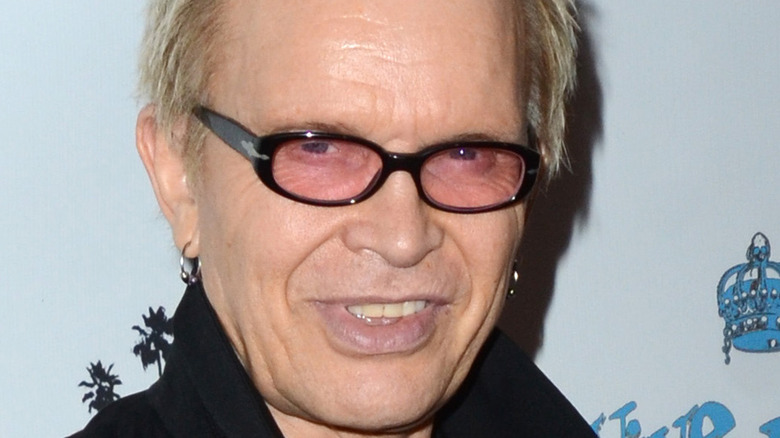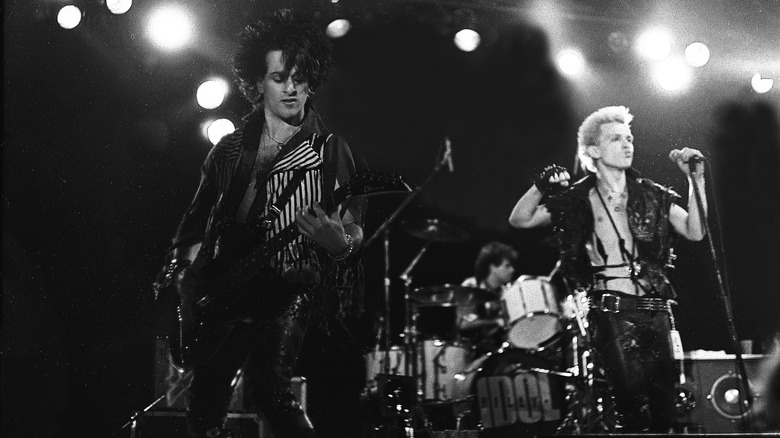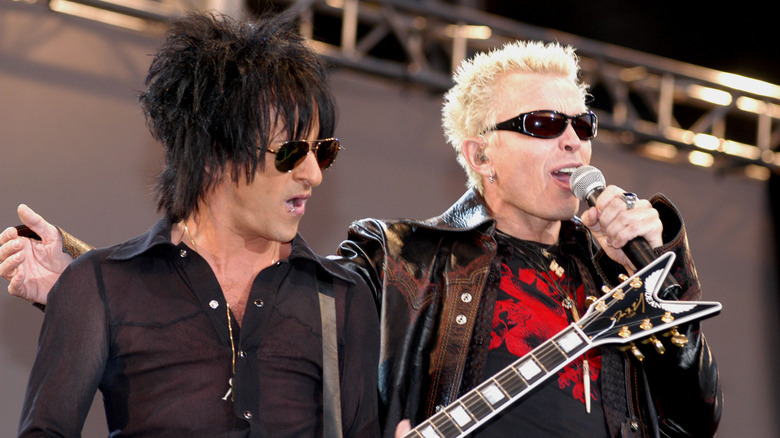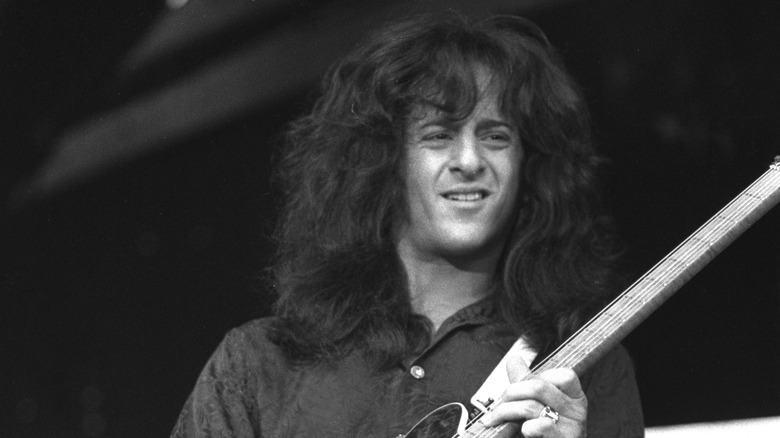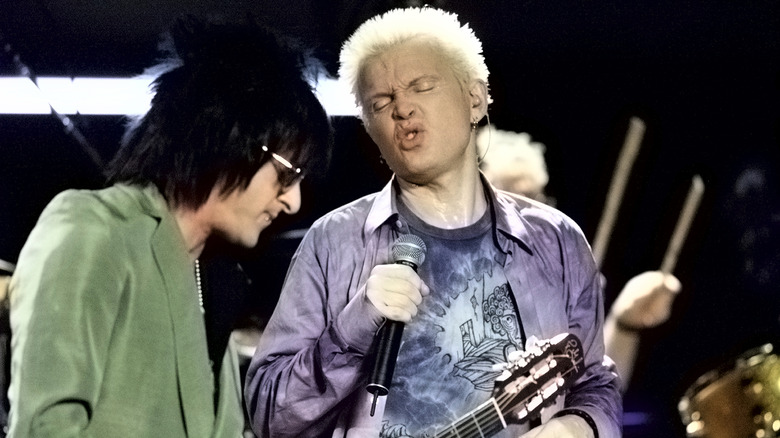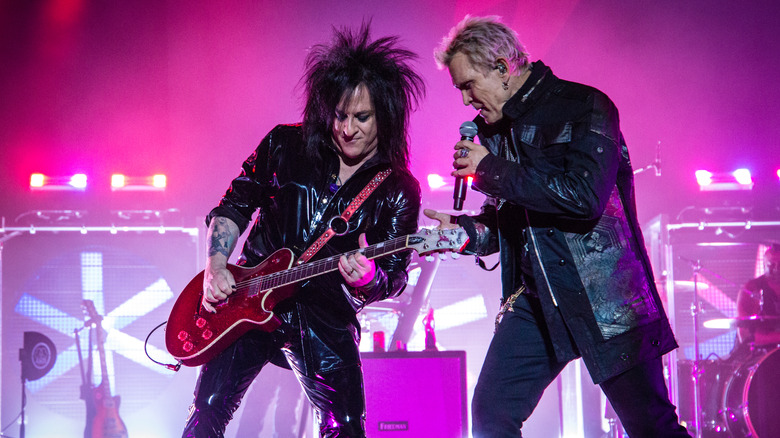The Truth About Billy Idol's Friendship With Steve Stevens
Classic rock is full of legendary, long-term partnerships between lead singers and guitarists — Mick Jagger and Keith Richards, Steven Tyler and Joe Perry, Stevie Nicks and Lindsey Buckingham, and of course, Billy Idol and his guitarist of many decades, Steve Stevens. Born Steven Bruce Schneider on May 5, 1959, in New York, New York, Stevens and Idol first got together when Idol left his home in London, England, to start a solo career in the United States after the breakup of his pop-punk band Generation X.
In a 2018 interview with the site Please Kill Me, Stevens recalled that he'd been playing in a New York band called Fine Maribus in the early 1980s. The band's album was never released, but they caught the attention of Bill Aucoin, who was also then the manager of the legendary Kiss. Stevens told Aucoin that he wanted to move on and find new collaborators, and two weeks later, Aucoin called Stevens and asked, "Have you ever heard of Billy Idol?"
When New York rock met British punk
In his Please Kill Me interview, Steve Stevens said he told his manager that he was familiar with Billy Idol's work in Generation X, including the songs "Ready, Steady, Go" and the original version of "Dancing With Myself," which Idol would later release as a solo track. The two met, and it quickly became clear that they had different philosophies when it came to making music. Stevens noted in the interview, "[T]he whole punk thing in England was a lot more political than it was in New York." He had grown up listening to a variety of music and going to lots of different clubs and later told Idol, "Yeah, I'm just a guitar player, I'm not a politician. In New York, it's a little bit different."
Stevens offered to help Idol find a guitarist if he wasn't what the singer wanted, but the two soon realized they worked extremely well together. Stevens notes that he knew the sound Idol wanted within a month. "He wanted to combine elements of dance music ... bit of guitar hero stuff in there, with the energy and attitude of punk rock. That essentially was our blueprint," he told Please Kill Me.
A meeting of the minds and the hairdos
Billy Idol and Steven Stevens' released their first collaboration in 1982 with the album "Billy Idol." Fueled by the hit singles "White Wedding" and "Hot In The City," the album went Gold by 1984, per RIAA, and Stevens' guitar playing was a key part of the album's sound (not to mention his flamboyant style and attitude, which complimented those of Idol). The band easily blended punk, rock, and dance, just as Stevens had intuited Idol was seeking. Looks and image were another important part of the band's success. Billy Idol videos were played often and enthusiastically on the newly introduced cable music channel MTV, and Steve Stevens was right there beside him.
It was a mutually beneficial artistic partnership. Stevens later told Please Kill Me about the positive effects Idol had on his playing: "It was what I didn't have in my previous band: a direction and someone you could bounce ideas off of. Also, someone who would challenge you. If it was a guitar solo, [Idol] would tell me to say the most with the least amount of notes. That was probably some of the best advice I ever got from someone."
Steve Stevens solo work was also impressive
Steve Stevens and Billy Idol went on to make two more 1980s albums with each other, 1983's "Rebel Yell" and 1986's "Whiplash Smile." According to the Steve Stevens page on Billy Idol's personal website, Stevens and Idol co-wrote the well-known songs "Rebel Yell," "Eyes Without A Face," and "Flesh for Fantasy." Stevens also had success during that decade apart from Idol. He played the electrifying guitar solo on Michael Jackson's 1988 song "Dirty Diana," which he told Please Kill Me came to be when he was signed as a solo artist to Warner Brothers records and came to know A&R man Ted Templeman.
Templeman had also arranged for Eddie Van Halen to record the guitar solo on Michael Jackson's "Beat It," and when Jackson's producer Quincy Jones asked for a recommendation for a new soloist, Templeman recommended Stevens. "It was Quincy, Michael and the engineer," Stevens told Pease Kill Me. "They were the only three guys in the studio. I was immediately comfortable because that's kind of the way I work with Billy. ... It was an absolutely great experience."
From MTV to VH1
Steve Stevens' work outside of Billy Idol includes his award-winning performance on the Harold Faltermeyer song "Top Gun Anthem," which won the 1987 Grammy for best pop instrumental performance (orchestra, group, or solo). As reported by AllMusic, Stevens left Idol's band at the end of the 1980s and did a slew of collaborations with other artists, including Ric Ocasek, the Thompson Twins, and Robert Palmer. He formed his own band, Steve Stevens' Atomic Playboys — which made one album — and joined former Motley Crue frontman Vince Neil for his 1993 solo album "Exposed" and the subsequent tour. He also joined bassist Tony Levin and drummer Terry Bozzio to make the prog-rock trio Bozzio Levin Stevens and made a 1999 solo album called "Flamenco A Go-Go."
In 2002, Stevens and Idol rejoined forces and appeared back together on music television, playing an acoustic set on "VH1 Storytellers." A review of the album made from the live performance published on the blog 2 Loud 2 Old Music called Steve Stevens a "highlight" of the album and noted that "Steve and Billy really get into it, and there is no denying the magic these two have when they play together."
Reunited and creative as ever
Since their reunion over 20 years ago, Billy Idol and Steve Stevens have continued on with their seemingly unbreakable musical partnership as well as their treasured friendship. Perhaps inspired by the "Storytellers" show that brought them back together, the two set out in 2019 on a tour they called "Turned On, Tuned In and Unplugged." A review on the site Heavy Consequence enthused that "the set made for a truly entertaining and downright informative evening" and noted that the storytelling that took place between the songs emphasized what excellent songwriters Idol and Stevens really are.
In a February 2022 interview with Guitar Player, Stevens discussed how he and Idol had spent the 2020 COVID-19 lockdown working on an EP of new songs called "The Roadside." Stevens also spoke enthusiastically about the experience that kept him and his longtime creative partner making music together, saying, "It was a very fun and relaxed atmosphere, and it turned out to be such a saving grace to be able to carry on and be creative. Billy and I were pretty bummed that we couldn't tour, so making this record really lifted our spirits."
